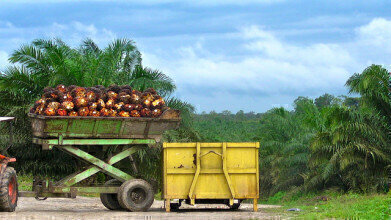Fuel for thought
What is Palm Oil?
Dec 29 2015
Palm oil is used in a plethora of products, from margarines, biscuits, breakfast cereals, breads and noodles to lipsticks, candles, shampoos, detergents and cleaning products. In fact, the latest research suggests that a huge 50% of all packaged items in supermarkets contain the controversial ingredient. One thing’s for sure – it’s now the most widely used vegetable oil in the world, making up 65% of the internationally traded resource. By 2020 economic analysts are expecting the use of palm oil to double, with the increasing populations of countries such as China and India fuelling demand.
A controversial ingredient
Unfortunately, the popularity of palm oil goes hand in hand with some serious environmental impacts. Clearing land to make way for palm oil plantations has led to deforestation on a massive scale. Indonesia and Malaysia have taken the majority of the brunt, with other Asian nations also losing forests to palm oil producers.
This has had a devastating impact on ecosystems, pushing an alarming number of species to the brink of extinction. Orangutans are particularly at risk, with elephants, rhinos and tigers also losing their natural habitats. Local populations are also suffering, with deforestation forcing indigenous people to move off their lands. This has stripped them of their livelihoods, and drastically reduced access to clean water and fertile soil.
Climate change activists are also pointing their fingers at the palm oil industry, maintaining that the destruction of tropical forests is a major contributor to global warming. Furthermore, almost 20% of recent oil palm expansion in Indonesia and Malaysia has been on peat swamps. When cleared and drained these unleash huge amount of CO2 into the atmosphere.
The perks of palm oil
While palm oil does have its downsides, it also has a myriad of benefits. It’s loaded with phytonutrients such as carotenoids (alpha-,beta-,and gamma-carotenes), sterols (sitosterol, stigmasterol and campesterol) and Vitamin E (tocopherols and tocotrienols). Plus, it provides livelihoods for developing regions, and has lifted countless communities out of poverty.
The path to sustainable palm oil
In a bid to minimise the environmental impact of palm oil production, groups such as WWF are working to create a sustainable industry. Already 18% of the world’s palm oil was certified sustainable in 2014, representing a 10% increase from 2011.
The world is becoming greener by the minute, and it’s not just the palm oil industry that’s playing its role. ‘Abating Fugitive VOC Emissions More Efficiently’ looks at new developments for the detection of refinery fugitive VOC emissions, and how they’re helping create a healthier planet.
Image via Flickr Creative Commons. Photo credits: Rainforest Action Network
Digital Edition
PIN 25.6 Buyers' Guide
January 2025
Buyers' Guide Directory - Product Listings by Category - Suppliers Listings (A-Z) Articles Analytical Instrumentation - ASTM D7042: The Quantum Leap in Viscosity Testing Technology -...
View all digital editions
Events
Jan 20 2025 San Diego, CA, USA
Jan 22 2025 Tokyo, Japan
Jan 25 2025 San Diego, CA, USA
SPE Hydraulic Fracturing Technology Conference and Exhibition
Feb 04 2025 The Woodlands, TX, USA
Feb 05 2025 Guangzhou, China



















